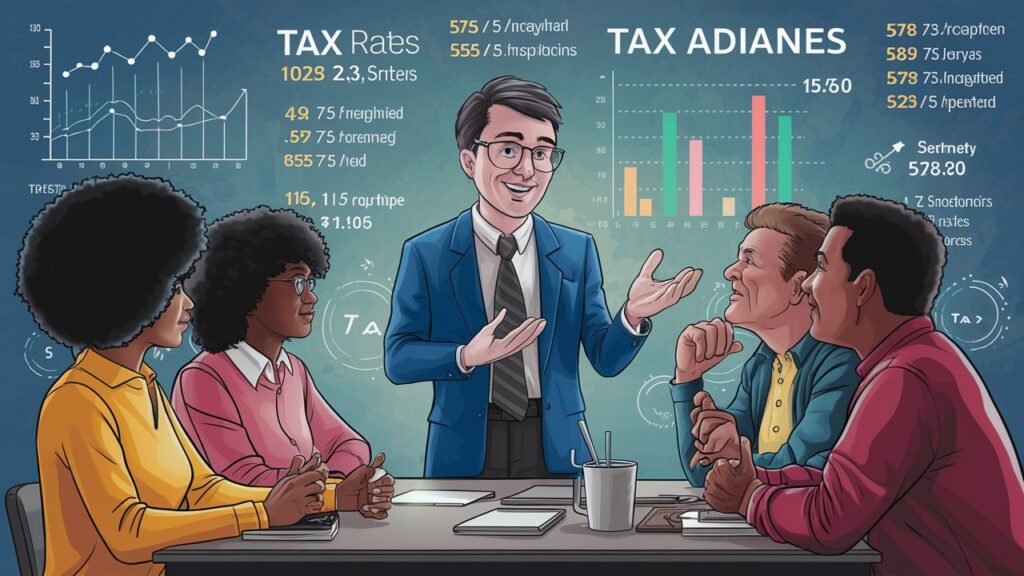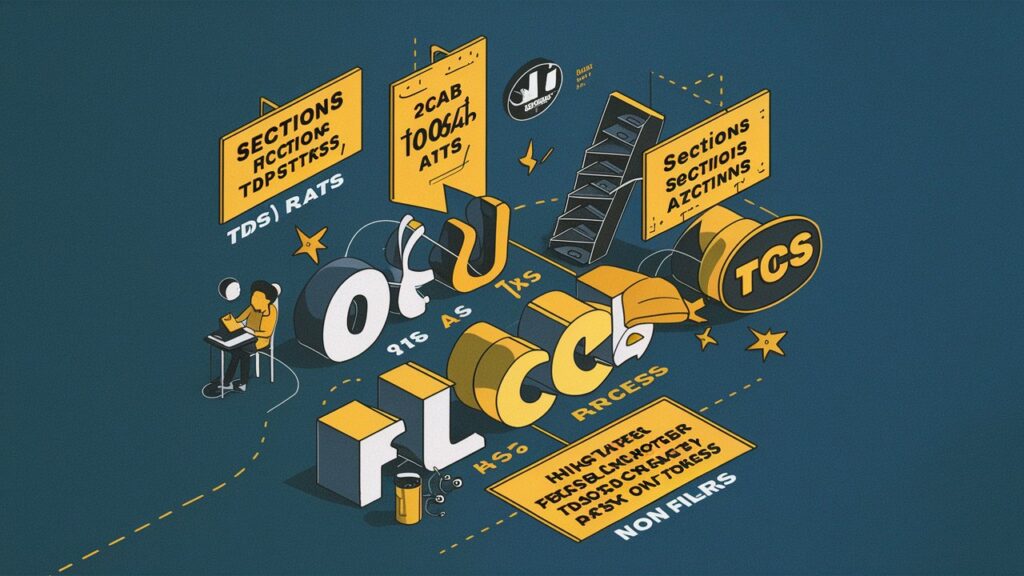Table of Contents
ToggleA Breath of Fresh Air for Certain Non-Filers of ITR: Recent Changes to TDS and TCS Provisions-

The Central Government of India has recently announced a pivotal update in the realm of Income Tax regulations with its notification (46/2024 Dated 27.05.2024). This notification grants the Reserve Bank of India (RBI) an exemption from the stringent provisions of Sections 206AB and 206CCA. These sections, introduced as part of the Finance Act of 2021, were designed to enforce tax compliance by imposing higher rates of Tax Deducted at Source (TDS) and Tax Collected at Source (TCS) on individuals and entities that failed to file their Income Tax Returns (ITRs). The new notification means that the RBI will not be subjected to these increased tax rates, even if it does not file an ITR. This exemption is significant as it recognizes the unique operational and regulatory role of the RBI, ensuring that it is not encumbered by additional tax compliance burdens that could impede its critical functions in the economy.
While this move is specific to the RBI, it highlights a broader trend in the government’s approach to tax regulation, aimed at providing relief to certain non-filers of ITRs. The Finance Act of 2023 has already introduced amendments to Sections 206AB and 206CCA, excluding specific categories of non-filers from the higher TDS and TCS rates. This change primarily benefits individuals who are not mandated to file an ITR due to their income levels or other statutory exemptions, such as senior citizens with non-taxable income from pensions or interest, and low-income individuals like small farmers and casual laborers. By targeting exemptions to those genuinely not required to file ITRs, the government seeks to create a fairer and more efficient tax system. These adjustments ensure that the tax burden is appropriately balanced, promoting voluntary compliance while focusing enforcement efforts on those who deliberately evade taxes.

Understanding Sections 206AB and 206CCA
Before diving into the recent changes, it’s important to understand the provisions of Sections 206AB and 206CCA. Introduced as part of the Finance Act, 2021, these sections were designed to enforce tax compliance by penalizing individuals who did not file their ITRs. Under these sections, higher rates of TDS and TCS were levied on non-filers, making non-compliance costly.
The rationale behind these sections was clear: encourage the filing of ITRs to ensure that the tax base remains robust and all taxable income is reported. Higher TDS and TCS rates served as a deterrent against non-compliance, compelling individuals to adhere to tax filing requirements.
The Recent Notification and Its Implications
The notification (46/2024) dated 27th May 2024 is a notable development, as it explicitly excludes the RBI from the application of Sections 206AB and 206CCA. This exemption means that the RBI will not be subject to higher TDS or TCS rates even if it does not file an ITR.
This move is significant for several reasons:
Institutional Relief: By exempting the RBI, the government acknowledges the unique role and operations of the central bank, ensuring that it is not burdened with additional tax compliance requirements that could hinder its functioning.
Precedent for Other Entities: While this notification specifically mentions the RBI, it opens the door for similar relief to be extended to other institutions or individuals who meet certain criteria.
Clarification of Policy Direction: This exemption clarifies the government’s stance on balancing tax compliance with the operational realities of key institutions.
Broader Relief for Non-Filers: The Finance Act, 2023
The Finance Act of 2023 brought more sweeping changes to the application of Sections 206AB and 206CCA. One of the key amendments was the exclusion of specific non-filers from the higher TDS and TCS provisions. This change is particularly relevant for individuals who are not required to file an ITR for the relevant assessment year and have been notified by the Central Government.
Who Benefits from This Change?
The amendment targets individuals who are not obligated to file an ITR due to their income levels or other statutory exemptions. For example:
Senior Citizens with Exempt Income: Many senior citizens earn income solely from sources like pension and interest, which may fall below the taxable limit. These individuals, who are not required to file ITRs, would previously have faced higher TDS/TCS if they didn’t file. The amendment now exempts them from these higher rates.
Low-Income Individuals: Those with income below the taxable threshold, such as small farmers or casual laborers, also benefit from this change. They no longer face the penalty of higher TDS/TCS for non-filing.
Specific Notified Entities: The government may notify other specific entities or individuals who are exempt from these sections. This could include charitable institutions, certain non-residents, or other categories as deemed necessary.

Implications of the Amendments
The changes to Sections 206AB and 206CCA reflect a more nuanced approach to tax compliance. Instead of a blanket imposition of higher TDS/TCS rates, the government is now focusing on targeted exemptions to ensure fairness and avoid undue burden on those not required to file ITRs. Here’s what these amendments imply:
Increased Fairness: By excluding those not obligated to file ITRs, the amendments prevent undue penalization of individuals who are compliant with their tax responsibilities but fall outside the filing requirements.
Administrative Ease: For the tax authorities, this means a reduced administrative burden. Enforcing higher TDS/TCS rates across the board requires significant oversight and enforcement resources, which can now be better allocated.
Encouragement of Voluntary Compliance: By making the tax system fairer and more predictable, these amendments encourage voluntary compliance. Individuals and entities are more likely to adhere to tax norms when they perceive the system as just.
Focused Compliance Efforts: The amendments allow the government to focus its compliance efforts on those who genuinely attempt to evade taxes, rather than penalizing those who are legally exempt from filing.
Navigating the Tax Landscape: Tips for Taxpayers
For taxpayers, understanding these changes is crucial for effective financial planning and compliance. Here are some tips to navigate the evolving tax landscape:
Stay Informed: Regularly check notifications from the Central Government regarding tax provisions. Staying updated ensures you are aware of any exemptions or changes that may benefit you.
Consult Tax Professionals: For individuals and businesses, consulting with tax professionals can help clarify your obligations and take advantage of any applicable exemptions.
File When Required: Even if you fall under the exempt category, consider filing an ITR if you have taxable income. It helps maintain a clear financial record and can be beneficial for loan applications, visa processes, and more.
Monitor Income Levels: Be aware of your income levels and sources. If your income approaches or exceeds the taxable threshold, ensure compliance to avoid penalties.
Conclusion:-
The recent notification and the amendments to Sections 206AB and 206CCA are steps towards a more balanced and fair tax system. By exempting certain non-filers from higher TDS and TCS rates, the government acknowledges the need for a nuanced approach to tax compliance. These changes benefit low-income individuals, senior citizens, and specific notified entities, ensuring that the tax system does not unduly penalize those who are not required to file ITRs.
For taxpayers, these developments underscore the importance of staying informed and compliant. As the tax landscape evolves, being proactive about understanding and adhering to tax obligations can help avoid unnecessary penalties and ensure smooth financial management.


